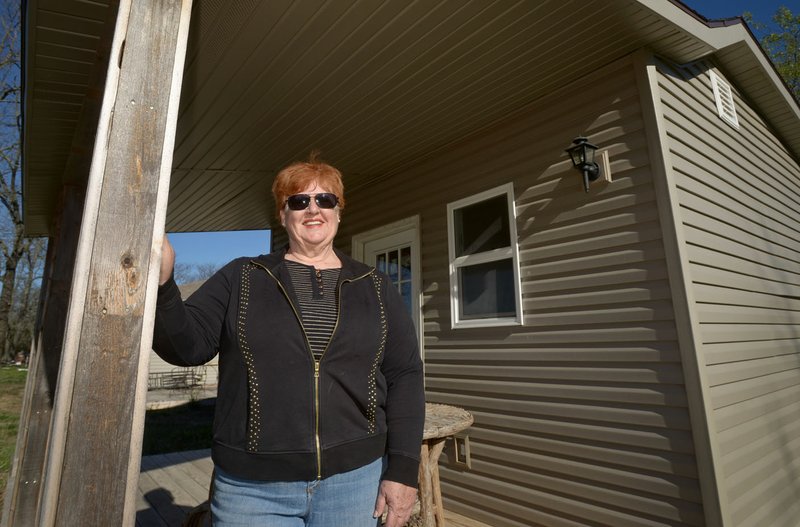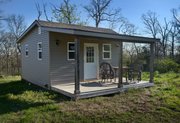ROGERS -- Will Hanna wasn't aware of any resources to help veterans transition to civilian life when he returned from military service in Vietnam. A new housing project might change that for future veterans.
"The military's given everything to you, saying, 'Here's what you'll wear and how to wear it, stay between the lines,'" Hanna said. Once you get back, "then you have all this freedom, and that can be dangerous for some.
Arkansas Veterans Village services
The Arkansas Veterans Village is a 501(c)(3) nonprofit organization with a 10-member board of directors. Veterans in need can contact the organization for a backpack of supplies and help securing other services. Those who would like to help the organization can make a financial donation, sponsor a house, donate land or attend any of the fundraisers planned for this year, including a clay shoot in September and a golf tournament planned for Oct. 7 in Bella Vista.
For more information, see arveteransvillage.o… or contact Sharon Whelchel at (479) 366-4923.
Source: Staff report
"There was nothing in place if I said 'I'm struggling.'"
The formation of the Arkansas Veterans Village seemed to Hanna an ideal support system. It's something he said plenty of his fellow Vietnam veterans could have benefited from, so he dedicates his time as a member of its board.
"They paid a heavy price to not transition back to life," Hanna said. "Some of these folks are 30-40 years into it and still never really got back to where they were when they left."
The nonprofit organization formed in January 2015 and is working to create an assembly of tiny houses where veterans from all eras can transition to civilian life with discounted rent, donated food and some transportation.
Plans are to design it for easy connection to resources, such as the Veterans Health Care System of the Ozarks and Northwest Arkansas Community College, so residents can make it to medical and mental health appointments, get into stable jobs and begin to save money or finish higher education.
Founders also hope to include activities for veterans to enjoy the company of their new community with life skills seminars, horseshoe tournaments, classes on woodworking and eventually a blacksmith shop.
"They fought for us; it's time we do something for them," said Sharon Whelchel, founder of the organization. "We want to help get their lives back on track."
Whelchel said she always wanted to find a way to give back to veterans. Now that she's retired, she has the time to devote to the endeavor.
Northwest Arkansas isn't the first area to adopt such a program.
Plans for a similar village were announced for Wichita Falls, Texas, through the North Texas Veteran's Relief Fund. Community First, a 27-acre village in Austin, provides houses for 250 formerly homeless people with 120 microhomes, among other options. Kansas City Veterans Community Project also is building a village of tiny homes for homeless veterans.
Kevin Fitzpatrick, sociology professor and director of the University of Arkansas Community and Family Institute, has long spoken in favor of what he calls microshelters, saying it's "absolutely inexcusable" for anyone to be unsheltered. The shelters can be a safer place to stay than the outdoors without the obligations or pressures of transitional housing and apartments, he said last month.
"We have to create a system that can bring them in safely," said Fitzpatrick, who has organized biennial homeless counts for Northwest Arkansas for a decade. "We need that intermediate step."
Increasing need
Whelchel said the growing population of homeless veterans in Washington and Benton counties alarmed her. An office within the Veterans Health Care System of the Ozarks told her there are 300 documented homeless veterans in the two counties who need housing and estimated another 200 remain undocumented and aren't registered for veteran services.
The U.S. Department of Housing and Urban Development estimates 39,471 veterans are homeless nationwide on any given night.
Dana Kenneson, staff assistant at Veterans Services of Benton County, said the office doesn't serve many homeless veterans because those who come in don't mention a need for housing. Those who hint at being in danger of becoming homeless are referred to Whelchel since there are few housing resources for veterans in the area, Kenneson said.
"We're blessed here in Northwest Arkansas to have many veterans organizations, and we do a lot of referrals" for other services, Kenneson said. The Benton County office primarily helps veterans file compensation claims.
A transitional home on 12th Terrace in Rogers is the only other resource the Veterans Services of Benton County would refer a homeless veteran to, she said.
Hunter Chastain, a Rogers native and one of the first 500 service members nationally deployed to Afghanistan during Operation Enduring Freedom, said many veterans have trouble adjusting when they no longer have barracks and meals provided.
"You have to start over on some of those aspects," Chastain said. "The vet village will help with that."
Chastain recently joined the village board.
About 12,700 veterans of Operation Enduring Freedom, Operation Iraqi Freedom and Operation New Dawn were homeless in 2010, according to the National Coalition for Homeless Veterans. The number of young homeless veterans is increasing but only constitutes 8.8 percent of the overall homeless veteran population.
Mental health and budgeting or finances are common struggles when they return home regardless of a veteran's circumstances when he entered the military, Chastain said.
"It's important to provide the whole spectrum in one village," he said. "It offers the full package, but they don't have to use all of it."
Project plans
The Arkansas Veterans Village board plans to buy land this summer with $10,000 raised at a fundraiser in October. Whelchel said the board is looking at properties in south Rogers and north of Springdale, preferably along an Ozark Regional Transit route and in close proximity to J.B. Hunt Transport Services, Central States Manufacturing and other companies frequently hiring veterans.
The village will consist of one large, motel-style communal building for retired and disabled veterans of the Vietnam War, Korean conflict and World War II, and as many as 60 tiny homes for veterans of younger generations. The number of tiny homes will depend on the amount of land the board is able to purchase, she said.
Combat veterans will be given first priority, and those living in the tiny homes can stay for as long as two years. Those living in the communal building can stay indefinitely.
"For younger veterans, it's a transitional program with the chance to participate in life skills seminars and earn better job placement or further their education," Whelchel said. "They'll get free food out of gardening and find a way to make a living and then make room for others coming in."
Tiny homes seemed like the ideal solution for veteran housing and certainly better than an apartment complex, Whelchel said.
"There's a big movement for them, and they're a lot cheaper to build than traditional housing with three bedrooms and two bath," Whelchel said. "Most of the veterans I talk to, they'd love to have their own space to go be on their own."
Hanna also saw benefit in tiny homes for veterans.
"It's something they can maintain and get an understanding of and live alone, not stay in someone else's bedroom or on their couch. It's four walls that are theirs."
The first prototype was 228 square feet and helped Whelchel and the board determine an approximate area of 400-450 square feet for the homes would be more appropriate. Each one will cost $38,000 to build, and veterans will be asked to pay $450 a month in rent, which also will cover utilities.
Whelchel said the board is working on sponsors for each of the houses, and the Benton County Democratic Party was the first to sign up. Sponsors will either pay for the expense of building the house or build it themselves. A plaque with their name will be placed on the front.
"I think the concept is wonderful," said Mark Leonard, founder and executive director of the Arkansas Freedom Fund. The Little Rock-based nonprofit group provides adapted outdoor rehabilitation equipment and recreational events for veterans. Leonard especially likes the organization's ability to take older, spouseless veterans and give them a place to live.
Leonard said the St. Francis House ministries in Little Rock is the only place he has to refer veterans when they need a safe and comfortable place to live. He's had to refer several within the past month.
"In the homeless arena, we work with St. Francis, and it's a process to get people there," Leonard said. That process mostly includes verification the homeless individual served in the military.
Leonard came up with a requirement for his veterans to volunteer hours with Recycle Bikes for Kids in return for their own bicycle after he saw a few bikes disappear. He suspected work in exchange for a bicycle would help keep the nonprofit group accountable to their donors.
He said other new veterans organizations such as the Arkansas Veterans Village might have a similar learning curve.
Hanna said the board is anticipating residents who might struggle with drug or alcohol abuse and want to be prepared to give them all the support and positive environment they need.
NW News on 04/10/2017


